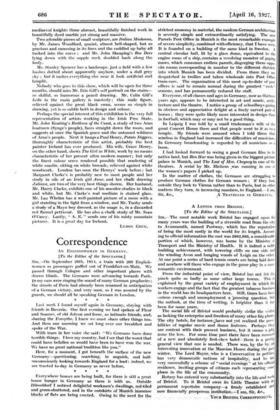Correspondence
AN ENGLISHWOMAN IN GERMANY.
[To the Editor of the SPECTATOR.]
SIR,—On September 26th, 1914, a train with 200 English- women as passengers puffed out of Frankfurt-on-Main. We passed through Cologne and other important places with drawn blinds. The Germans were advancing towards Paris. In my ears were ringing the sound of many German prophecies ; the streets of Paris had already been renamed in anticipation of a German victory, and very• soon, so I was assured by the guards, we should all be speaking German in London.
Last week I found myself again in Germany, staying with friends in Bavaria. Our first evening we had spoken of Fleur and Soames, of old Jolyon and Irene, as intimate friends, and, sharing the Forsyths, I knew we must share other things too. And then one morning we sat long over our breakfast and spoke of the War.
With tears in her voice she said : "We Germans have done terrible things. I love my country, but I see that the worst that could have befallen us would have been to have won the war. We have no great national tradition like you."
Here, for a moment, I got beneath the surface of the new Germany—questioning, searching, in anguish, and half- unconsciously looking towards England for a lead : indeed, we are trusted to-day in Germany as never before.
• * *
Everywhere houses are being bid% for there is still a great house hunger in Germany as there is With us. _ Outside Diisseldorf I noticed delightful workmen's dwellings, red-tiled and green-shuttered, and in the outskirts of Munich immense blocks of flats are being erected. Owing to the need for the strictest economy in material, the modern German architecture is severely simple and extraordinarily satisfying. The new Parcels Post Office in Munich is the most remarkable example of severe simplicity, combined with efficiency, that I have seen. It is founded on a building of the same kind in Sweden. A central circular hail, lit by a glass dome, equivalent to the engine room of a ship, contains a revolving monster of gaping maws, which consumes endless parcels, disgorging them oppa. site rooms corresponding in number to • the -different districts into which Munich has been divided. From there they arc despatched in trollies and taken wholesale into Post °flirt tram-cars. The organization of this most up-to-date of post offices is said to remain normal during the greatest " rush', seasons, and has permanently reduced the staff.
Everyone, of all classes and ages in Germany, now as thirteen years ago, appears to be interested in art and music, archi- tecture and the theatre. I notice a group of schoolboys gazing in obvious and appreciative delight at a finely carved pair of horses ; they were quite likely more interested in design than in football, which may or may not be a good thing.
In Leipzig I was told by a small tradesman's wife of the great Concert House there and that people went to it as to a temple. My friends were amazed when I told them that wireless in England had increased the difficulties of musicians. In Germany broadcasting is regarded by all musicians as a boon.
I. had looked forward to seeing a good German film in its native land, but Ben Hur was being given in the biggest picture palace in Munich, and The Last of Mrs. Cheyney in one of the theatres. A serial by Mr. Hichens was running in one of the women's papers I picked up.
In the matter of clothes, the Germans are struggling to produce German clothes for German women ; if they look outside they look to Vienna rather than to Paris, but in other matters they turn, in increasing numbers, to England.—I an


































 Previous page
Previous page